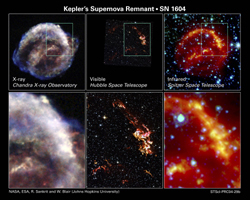 This image, PIA06908, and PIA06910 represent views of Kepler's supernova remnant taken in X-rays, visible light, and infrared radiation.
This image, PIA06908, and PIA06910 represent views of Kepler's supernova remnant taken in X-rays, visible light, and infrared radiation.Each top panel in the composite above shows the entire remnant. Each color in the composite represents a different region of the electromagnetic spectrum, from X-rays to infrared light. The X-ray and infrared data cannot be seen with the human eye. Astronomers have color-coded those data so they can be seen in these images.
The bottom panels are close-up views of the remnant. In the bottom, center image, Hubble sees fine details in the brightest, densest areas of gas. The region seen in these images is outlined in the top, center panel.
The images indicate that the bubble of gas that makes up the supernova remnant appears different in various types of light. Chandra reveals the hottest gas [colored blue and colored green], which radiates in X-rays. The blue color represents the higher-energy gas; the green, the lower-energy gas. Hubble shows the brightest, densest gas [colored yellow], which appears in visible light. Spitzer unveils heated dust [colored red], which radiates in infrared light.

